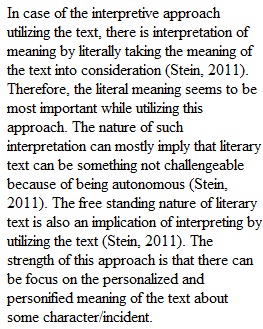


Q Week 1 Response Paper After completing the Week 1 reading assignment, respond to the questions below in a 3- to 4-page, double-spaced paper. Although the responses should be based upon a careful reading of the textbook, they should represent your own view. Where necessary, use in-text documentation to acknowledge sources. 1. On pages 5–18, Stein describes three different interpretive approaches, each distinguished by its “determiner of meaning,” i.e., text, reader, and author. After describing each approach, identify the approach’s strengths and weaknesses. 2. In Chapter 2, Stein uses a clearly defined vocabulary to describe biblical interpretation. Identify 3–4 such words and discuss their importance for interpretation. 3. How does Stein understand the role of the Holy Spirit in interpretation (Pages 60-64)? First summarize the author’s position and then write whether or not you agree or disagree with his position. Make sure you explain your position.
View Related Questions